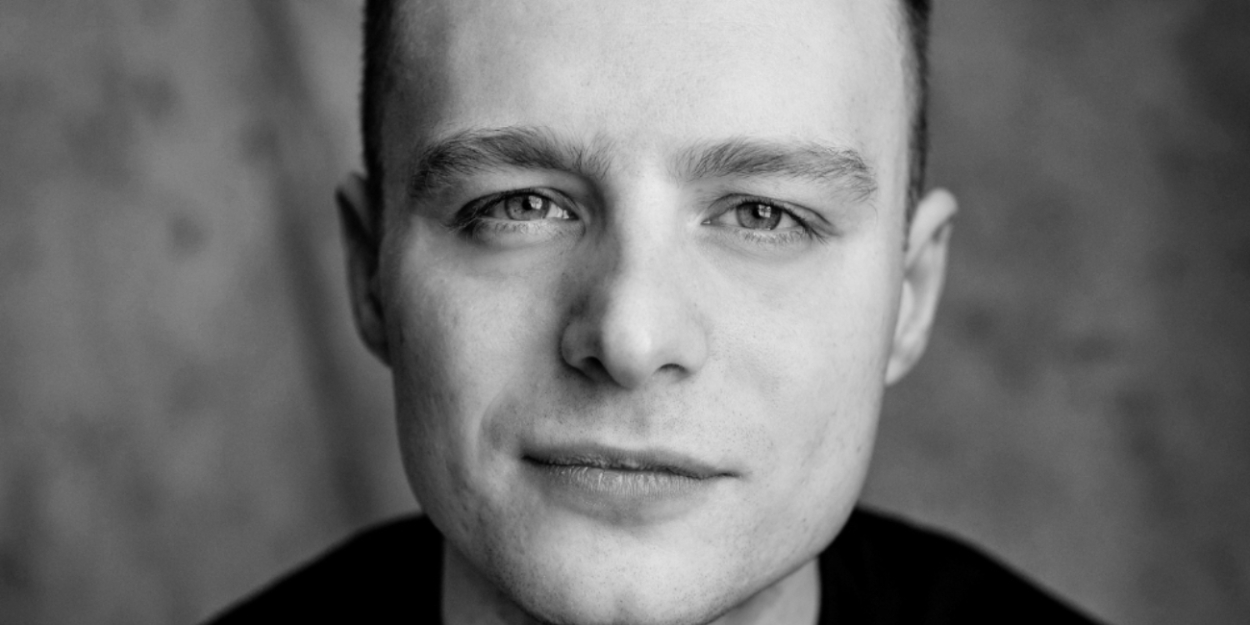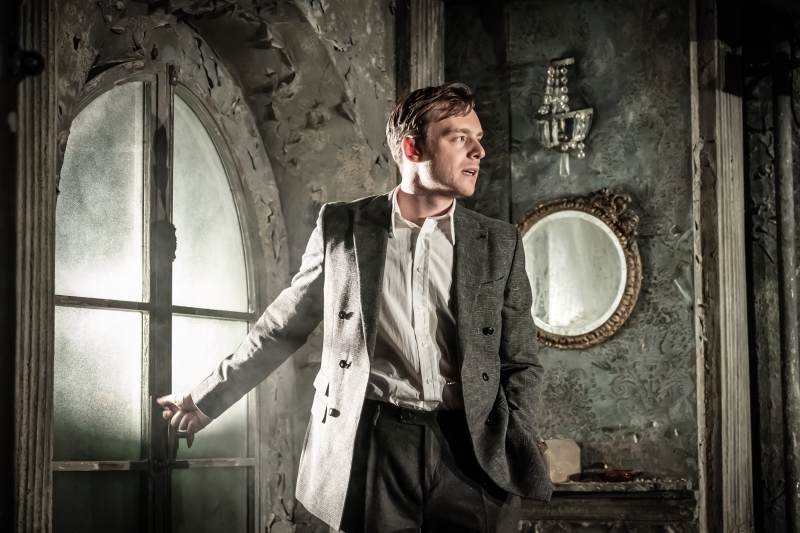Interview: 'There's a Lot of History in the Room With Me': Actor Luke Thallon of COLD WAR on the Importance of History and Heritage
'I'm connecting to something deeply personal, not for the first time, but in a way that I haven't before'

Cold War, the musical adaptation of the Polish film of the same name, has opened at the Almeida Theatre. The show tells the story of Wiktor and Zula, two people whose love spans decades and countries. Along with music from Elvis Costello, there are traditional Polish songs and choral arrangements.
BroadwayWorld spoke with Luke Thallon, who plays Wiktor, a composer who falls in love with Zula, a singer. We discussed what it has been like to return to the Almeida Theatre, what it is like to be taking on a new adaptation and the importance of heritage in works of art like Cold War.
How did you first get started in the world of theatre?
I was a bit of a naughty kid! I think I was a bit of an attention-seeking kid. And my parents, who were both athletes, were trying to find some sort of energetic output for me! [Laughs] So they took me into dance and drama classes on the Saturday when I was very young. And for a while, it was just something that I did. I didn't really have any plans to go into acting when I was a teenager - I wanted to be a dentist! And then I got swept away to the National Youth Theatre for a summer whilst I was doing my Science A Levels and realised that it was going to be, for me, more fulfilling. Perhaps more dangerous, perhaps harder. I'm not sure actually -I think dentistry is pretty hard!
But I got the bug. And then I started going to the theatre regularly by myself, grabbing single cheap seats for plays - the Duke of York’s, the Wyndham’s, the Harold Pinter - I would pop up on a train and go see them for £15 by myself. That was really important. I can't remember exactly how I got introduced to plays and the West End, but I remember booking my first solo seats and going to the theatre by myself and watching great actors who I didn't really know at the time. I was suddenly watching stuff that I'd never seen done before, acting that I had never imagined was possible on stage. Great actors like Stephen Dillane and lots of others. But yeah, caught the bug, auditioned for drama school and went!
Were you aware of the original version of Cold War before joining this adaptation?
Yes! I saw it when it came out. It was a Polish film about artists and Pawlikowski is a great artist himself, so it was unmissable I still remember exactly where I saw it. And then it came to me earlier this year as a workshop that they were doing, and I've stuck with it ever since. I really believe in it.
.jpg)
Could you tell us a bit about the story of Cold War and the role your character plays?
I play a singing teacher, a choirmaster, called Wiktor in Poland in the late ‘40s. He falls in love with a singer called Zula, and the story then spans fifteen years and crosses borders and follows them together and apart and together and apart. It's about love against a difficult, turbulent, political backdrop, it's about obsession, it's about sex, it's about addiction. But all the while framed within the the very turbulent, difficult political climate of Europe, post World War Two. So it's a really fascinating and intelligent look about the micro-human experience and the big macro-political world at the same time.
Have you done much research for the role?
I've done loads, partly because of my heritage. My dad's Polish, my mum was born to a Belgian father in Germany. So I've done a lot of work - Camp Siegfried, Leopoldstadt and Patriots - about anywhere other than England! [Laughs] I've done a lot of research about 20th-century European history, as I've had to do for other pieces. But for this one, it's so funny, the most worthwhile research has been speaking to my family, speaking to my dad about what my grandparents went through.
My grandfather was one of the 1.7 million Poles who was deported to the Soviet Union and kept in a labour camp there. I grew up with my extended family speaking Polish from the dinner table. And so there's a lot of ghosts in the room - there's a lot of history and family in the room with me as I do this, and my emotional connection to them. My duty to them to tell this story is the most important research that I've had to do. And that's very hard and exhausting, and emotionally quite difficult, but that's the name of the game. That's why we do what we do.
So have you found that you tend to be drawn more to roles that have that tie, like Patriots and Leopoldstadt?
Not intentionally! I don't think it's any of my doing. It's interesting, isn't it, what you put out into the world . . . In Leopoldstadt, I played a Jewish man who had neglected his family history, and in Camp Siegfried, I played a young Nazi. So I've sort of done both sides of the spectrum! [Laughs] Which is really interesting, and I don't know why I'm seen as being capable of portraying both. I don't know. I don't seek it out, not at all. More how the industry sees you, how the world sees you. Maybe I come across as very European and not very British at all, because I'm not really!
How do you balance portraying emotional moments while not letting it carry into your personal life?
It does carry into my personal life! [Laughs] For me, there's just no stopping it. Over the last few years, I've done stuff which has been fairly exhausting. But I've had to learn how to look after myself. And it does [carry]. When you spend most of the day in someone else's headspace, how could that not get inside you physiologically? It's probably every emotional and physical therapist’s worst nightmare!
Anyone would say, “Whatever you do, don't exert yourself in such a strenuous way repeatedly - it's the way that you will cause injury.” And yet we as actors have to regularly exert ourselves in a way that is emotionally battering. And so you psychologically create these mechanisms and these links to be able to go to that place each night, that place of darkness, and you have to really look after yourself. I have a wonderful partner who I love endlessly, I have a brilliant family, so I'm very lucky, but it's a constant thing. There's no answer. There’s no quick fix. You just have to clock in when you're not doing well and be gentle with yourself.

What has it been like returning to the Almeida for another production?
Gorgeous! I love it here. I think Rupert [Goold, Artistic Director] runs the finest building in London. It is all about excellence, striving for quality, and detail and courage, and those are things that I really stand for. I had the most formative experience here when I was at drama school and came to see Rob Ickes’ Uncle Vanya (2016) and saw it four times. It completely changed my life. I suddenly saw the possibilities of what theatre could be - how alive it could be, how honest it could be, how it was a true ensemble working together. I believed they were family. I believed I was in their living room. And I fell in love with this building. And it's just luck, isn't it? This whole job. It's just luck that this is number four in the last five years. I'm on a toilet door, which is one of the greatest achievements I'll never ever live down. If you take a wee in the central toilet, you'll look into my eyes. [Laughs]
[Laughs] That's what you were thinking of when you were in drama school!
One day, one day!
What do you hope audiences take away from Cold War?
That's a hard one because I'm not really in control of what they take away and I wouldn't want to prescribe a certain experience to anyone. To me, the most rewarding thing has been working with this incredible company. I've never been in a room with more Eastern European artists. So many people have Eastern European heritage, so many people that don't even speak English as a first language . . . We've worked with Polish language consultants and dance consultants. For me and for lots of the company, that's just been so profoundly gratifying and moving.
When I've had Polish friends come and visit the show, they've been moved by seeing the Polish dance and Polish costumes. That, for me, has been worth it. I'm connecting to something deeply personal, not for the first time, but in a way that I haven't before. And if others can come, regardless of their heritage, and feel something about love and intimacy and family and heritage, then that would be wonderful. But also you're allowed to hate it - you don't have to like it! You might hate it, and that's fine, too. [Laughs]
You mentioned the different consultants. What has it been like bringing people in to learn more about Polish culture?
Just amazing! And only an opportunity for me to kick myself for not knowing more about my heritage and my history. But all being said this is not to say that the people who don't have Eastern European heritage in the company are not welcome or are not qualified to be doing it. In fact, it's quite the opposite. The fact that there's some members of the company who don't have Eastern European heritage is just even more amazing! You think, “You're giving your time and your energy to tell this story which isn't yours, and that's just beautiful.” I think that's so generous and very touching
And finally, how would you describe Cold War in one word?
Heart.
Cold War runs until 27 January 2024 at the Almeida Theatre.
Photo Credit: Marc Brenner
Comments

Videos

